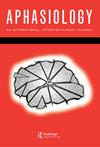“I Wasn’t Just Sitting There”: Empowering Care Partners through the Aphasia-Friendly Reading Approach
IF 1.5
4区 医学
Q2 AUDIOLOGY & SPEECH-LANGUAGE PATHOLOGY
引用次数: 0
Abstract
ABSTRACTBackground Sharing stories is a way that people make meaning out of life and connect with others socially. For couples in which one person has aphasia, the ability to have conversations and share stories may be disrupted. Many people with aphasia benefit from support in constructing and sharing stories with others. To share experiences with his wife, the spouse of a person with aphasia developed an intervention approach called Aphasia-Friendly Reading that supports oral storytelling and sharing stories with others.Aim The current study explored the experiences of care partners in a pilot study using the Aphasia-Friendly Reading approach.Methods & Procedures Three people with aphasia and their care partners participated in the Aphasia-Friendly Reading pilot study one hour per week for 9 to 14 weeks. Following the pilot program, each care partner was interviewed about their experience participating in the study. Interview data was analysed using reflexive thematic analysis.Outcome & Results Three major themes were identified: (1) Care partner empowerment, (2) Collaboration, and (3) Different therapy experience. Care partners expressed that they were “totally involved” in all stages of the intervention and that they highly valued being involved. Further, care partners reported specific ways that they started taking initiative in supporting their partner with aphasia outside of the sessions. Care partners described the project as collaborative, noting the role of all participants in story co-construction and mentioning how they both taught and learned from graduate student clinicians. The care partners reported that the project was distinctly different from their previous therapy experiences, noting that they appreciated the person-centeredness of the stories, the fun of working together in sessions, and the opportunity to share their stories with the aphasia group.Conclusion The results indicated that the care partners experienced benefits of being actively included in the Aphasia-Friendly Reading approach. The approach appears to be harmonious with core values of the Life Participation Approach to Aphasia and research on the value of considering aphasia to be a family issue rather than an individual issue.KEYWORDS: care partnersnarrativescript trainingoral readingaphasia AcknowledgmentsThe authors thank the participants and families and the members of the Wichita Adult Language Lab, Taylor Brandenberger, Sydney Brown, Ellasyn Heuer, Addison Powell, and Madison Zwanziger for serving as graduate clinicians and Sabrina Gooch, Logan Patterson, Emily Ray, and Madeline Rondeau for transcription support, and the audience of the Aphasia Access Leadership Summit 2021 Brag and Steal session for encouragement in the early phase of this project.CRediT Author StatementErin O’Bryan: conceptualisation, writing–original draft, review and editing, visualisation, investigation, supervision, analysis. Harold Regier: conceptualisation of therapy approach, writing–original draft. Katie Strong: conceptualisation, writing–original draft, review and editing, visualisation, analysis.Disclosure statementHarold Regier receives a small amount of royalties from the sale of his self-published book which is mentioned in the article. Erin O’Bryan is employed by Wichita State University. Katie Strong is employed by Central Michigan University. There was no funding for this project.Data Availability StatementThe participants of this study did not give written consent for their data to be shared publicly, so due to the sensitive nature of the research, supporting data is not available.Supplementary dataSupplemental data for this article can be accessed online at https://doi.org/10.1080/02687038.2023.2272956.“我不只是坐在那里”:通过失语友好阅读方法赋予护理伙伴权力
【摘要】背景分享故事是人们从生活中获得意义并与他人建立社会联系的一种方式。如果夫妻中有一方患有失语症,那么交谈和分享故事的能力可能会受到干扰。许多失语症患者在与他人构建和分享故事方面得到了帮助。为了与妻子分享经验,失语症患者的配偶开发了一种名为“失语症友好阅读”的干预方法,支持口头讲故事和与他人分享故事。目的:本研究采用失语症友好阅读方法,在一项试点研究中探讨护理伙伴的经验。方法与步骤3名失语症患者及其护理伙伴参加了为期9至14周的失语症友好阅读先导研究,每周1小时。在试点项目之后,每个护理伙伴都接受了关于他们参与研究的经历的采访。访谈数据采用反身性主题分析进行分析。结果和结果确定了三个主要主题:(1)护理伙伴授权,(2)协作,(3)不同的治疗体验。护理伙伴表示,他们“完全参与”了干预的所有阶段,他们非常重视参与。此外,护理伙伴报告了他们在治疗之外开始主动支持失语症伙伴的具体方式。护理合作伙伴将该项目描述为协作,注意到所有参与者在故事共同构建中的作用,并提到他们如何教授和向研究生临床医生学习。护理伙伴报告说,这个项目与他们以前的治疗经历明显不同,他们注意到他们欣赏以人为中心的故事,在会议中一起工作的乐趣,以及与失语症组分享他们的故事的机会。结论:失语友好性阅读方法对护理伙伴有积极的影响。该方法似乎与失语症生活参与方法的核心价值观以及将失语症视为家庭问题而不是个人问题的价值研究相协调。关键词:作者感谢参与者和家庭以及威奇托成人语言实验室的成员,Taylor Brandenberger, Sydney Brown, Ellasyn Heuer, Addison Powell和Madison Zwanziger作为研究生临床医生,以及Sabrina Gooch, Logan Patterson, Emily Ray和Madeline Rondeau的转录支持。以及2021年失语症访问领导力峰会吹牛和偷窃会议的听众,以鼓励该项目的早期阶段。作者声明enterin O 'Bryan:构思、写作——原稿、审查和编辑、可视化、调查、监督、分析。哈罗德·雷吉尔:治疗方法的概念化,原稿。凯蒂·斯特朗:概念化,写作-原稿,审查和编辑,可视化,分析。披露声明harold Regier从他在文章中提到的自己出版的书的销售中获得一小部分版税。艾琳·奥布莱恩受雇于威奇托州立大学。凯蒂·斯特朗受雇于中密歇根大学。这个项目没有资金。数据可用性声明本研究的参与者没有书面同意公开分享他们的数据,因此由于研究的敏感性,无法获得支持数据。本文的补充数据可以在线访问https://doi.org/10.1080/02687038.2023.2272956。
本文章由计算机程序翻译,如有差异,请以英文原文为准。
求助全文
约1分钟内获得全文
求助全文
来源期刊

Aphasiology
医学-临床神经学
CiteScore
4.40
自引率
15.00%
发文量
74
审稿时长
6-12 weeks
期刊介绍:
Aphasiology is concerned with all aspects of language impairment and disability and related disorders resulting from brain damage. It provides a forum for the exchange of knowledge and the dissemination of current research and expertise in all aspects of aphasia and related topics, from all disciplinary perspectives.
Aphasiology includes papers on clinical, psychological, linguistic, social and neurological perspectives of aphasia, and attracts contributions and readership from researchers and practitioners in speech and language pathology, neurology, neuropsychology and neurolinguistics. Studies using a wide range of empirical methods, including experimental, clinical and single case studies, surveys and physical investigations are published in addition to regular features including major reviews, clinical fora, case studies, and book reviews.
 求助内容:
求助内容: 应助结果提醒方式:
应助结果提醒方式:


